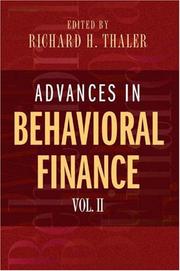| Listing 1 - 8 of 8 |
Sort by
|
Book
Year: 2013 Publisher: National Bureau of Economic Research
Abstract | Keywords | Export | Availability | Bookmark
 Loading...
Loading...Choose an application
- Reference Manager
- EndNote
- RefWorks (Direct export to RefWorks)
Digital
Year: 2013 Publisher: Cambridge, Mass. National Bureau of Economic Research
Abstract | Keywords | Export | Availability | Bookmark
 Loading...
Loading...Choose an application
- Reference Manager
- EndNote
- RefWorks (Direct export to RefWorks)
Feedback from stock prices to cash flows occurs because information revealed by firms' stock prices influences the actions of competitors. We explore the implications of feedback within a noisy rational expectations setting with incumbent publicly traded firms and privately held new entrants. In this setting the equilibrium relation among stock prices and both future dividends and aggregate output depends on the strategic environment in which these firms operate. In general, under reasonable conditions, the relations between prices, dividends, and economic output in our framework are consistent with empirical evidence in the macroliterature. We also generate new, potentially testable, implications.
Digital
Year: 2000 Publisher: Cambridge, Mass. National Bureau of Economic Research
Abstract | Keywords | Export | Availability | Bookmark
 Loading...
Loading...Choose an application
- Reference Manager
- EndNote
- RefWorks (Direct export to RefWorks)
Book
Year: 2013 Publisher: Cambridge, Mass. National Bureau of Economic Research
Abstract | Keywords | Export | Availability | Bookmark
 Loading...
Loading...Choose an application
- Reference Manager
- EndNote
- RefWorks (Direct export to RefWorks)
Feedback from stock prices to cash flows occurs because information revealed by firms' stock prices influences the actions of competitors. We explore the implications of feedback within a noisy rational expectations setting with incumbent publicly traded firms and privately held new entrants. In this setting the equilibrium relation among stock prices and both future dividends and aggregate output depends on the strategic environment in which these firms operate. In general, under reasonable conditions, the relations between prices, dividends, and economic output in our framework are consistent with empirical evidence in the macroliterature. We also generate new, potentially testable, implications.
Book
Year: 2000 Publisher: Cambridge, Mass. National Bureau of Economic Research
Abstract | Keywords | Export | Availability | Bookmark
 Loading...
Loading...Choose an application
- Reference Manager
- EndNote
- RefWorks (Direct export to RefWorks)
This paper offers a multisecurity model in which prices reflect both covariance risk and misperceptions of firms' prospects, and in which arbitrageurs trade to profit from mispricing. We derive a pricing relationship in which expected returns are linearly related to both risk and mispricing variables. The model thereby implies a multivariate relation between expected return, beta, and variables that proxy for mispricing of idiosyncratic components of value tends to be arbitraged away but systematic mispricing is not. The theory is consistent with several empirical findings regarding the cross-section of equity returns, including: the observed ability of fundamental/price ratios to forecast aggregate and cross-sectional returns, and of market value but not non-market size measures to forecast returns cross-sectionally; and the ability in some studies of fundamental/price ratios and market value to dominate traditional measures of security risk. The model also offers several untested empirical implications for the cross-section of expected returns and for the relation of volume to subsequent volatility.
Book
Year: 2021 Publisher: Cambridge, Mass. National Bureau of Economic Research
Abstract | Keywords | Export | Availability | Bookmark
 Loading...
Loading...Choose an application
- Reference Manager
- EndNote
- RefWorks (Direct export to RefWorks)
Different share classes on the same firms provide a natural experiment to explore how investor clienteles affect momentum and short-term reversals. Domestic retail investors have a greater presence in Chinese A shares, and foreign institutions are relatively more prevalent in B shares. These differences result from currency conversion restrictions and mandated investment quotas. We find that only B shares exhibit momentum and earnings drift, and only A shares exhibit monthly reversals. Institutional ownership strengthens momentum in B shares. These patterns accord with a setting where momentum is caused by informed investors who underreact to fundamental signals, and short-term reversals represent premia to absorb the demands of noise traders. Overall, our findings confirm that clienteles matter in generating stock return predictability from past returns.
Book

ISBN: 9781400829125 Year: 2005 Publisher: Princeton, NJ
Abstract | Keywords | Export | Availability | Bookmark
 Loading...
Loading...Choose an application
- Reference Manager
- EndNote
- RefWorks (Direct export to RefWorks)


ISBN: 9781400829125 9780691121741 Year: 2005 Publisher: Princeton, N.J. Princeton University Press
Abstract | Keywords | Export | Availability | Bookmark
 Loading...
Loading...Choose an application
- Reference Manager
- EndNote
- RefWorks (Direct export to RefWorks)
| Listing 1 - 8 of 8 |
Sort by
|

 Search
Search Feedback
Feedback About UniCat
About UniCat  Help
Help News
News